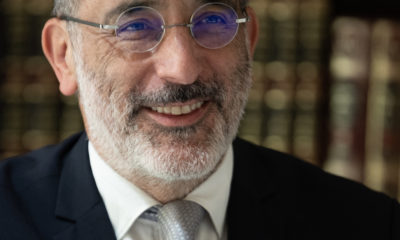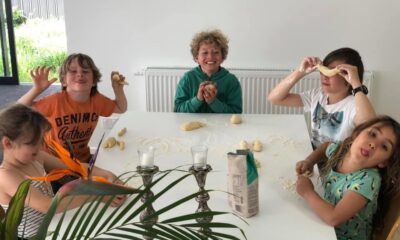
Shabbos Project

Proudly South African: project brings Shabbos home
At a time of great difficulty and uncertainty, this year’s globe-spanning Shabbos Project, dubbed the “Shabbos of unity”, will bring Jews of all backgrounds together in 1 500 cities and more than 100 countries.
The local community is gearing up for this year’s Shabbos Project, with shuls across the country hosting dinners and lunches, learning programmes, Shabbatons, havdalah concerts and other initiatives, and with challah bakes in Cape Town, Durban, and Johannesburg.
What started years ago in 2013 as the brainchild of South African Chief Rabbi Dr Warren Goldstein as a local project is now massive around the world. This Shabbat will herald celebrations co-ordinated by a team of thousands of city partners worldwide, alongside tens of thousands of volunteers on the ground.
Israel continues to be the global hub of the Shabbos Project, with 10 000 apartment buildings across the country participating, representing almost half a million people.
This year’s Shabbos Project comes at a historic moment in time, as Israel fights a war on multiple fronts following the brutal attack of 7 October, and as Jewish communities around the world face a tide of antisemitism that hasn’t been experienced in decades.
“Since 7 October, Shabbos has emerged as a source of strength and comfort, a fortress of faith and family, a shining light of inspiration and meaning amidst the pain and uncertainty,” says Goldstein, pointing out that this year’s event will be the most important since the project began.
“Now especially,” Goldstein says, “the Shabbos Project is a chance for Jews everywhere – in Israel, the United States, and throughout the world – to rally together, to unite around Shabbos, to stand proud and say, ‘This is who we are. We will not be defined by those who hate us, and with G-d’s help, we will not allow our enemies to defeat us.’”
On Thursday, challah bakes in Johannesburg and Cape Town, featuring international celebrity chef Jamie Geller, known for her bestselling cookbooks and viral cooking videos, were expected to draw more than 5 000 women. Rachel Goldberg-Polin, whose son Hersh was murdered by Hamas, delivered a live virtual address.
Shuls around the country will be running special Shabbos programmes and initiatives, including Sandton Shul, which has booked out two hotels for families to keep Shabbos together.
“Our objective this year, as in previous years, is simply to enable as many people as possible to keep Shabbos together,” says Goldstein, “drawing people to the full, immersive, 25-hour Shabbos experience.
“Over the past year, our deep Jewish instinct to seek out Shabbos in moments of difficulty and uncertainty has kicked in. There are countless inspiring stories of how Shabbos has held us, giving us the courage we need.”
This year’s Shabbos Project launch captures some of those stories: a hostage captured by Hamas and freed after 55 days in captivity; a Nova festival survivor; a college student at Columbia University.
As Goldstein puts it, “They and so many others have turned to Shabbos for hope and connection.”
This year, the Shabbos Project also released the first ever Shabbos “commercial”, produced by award-winning local filmmaker Jordy Sank.
For Sank, who won Best South African Documentary at the Durban International Film Festival for “I Am Here”, a moving portrait of Capetonian Holocaust survivor Ella Blumenthal, capturing the beauty and meaning of Shabbos was an entirely different challenge.
“The chief rabbi approached me with an idea to create a more poignant, narrative-based video for this year’s Shabbos Project, exploring new media as a means of promoting the project and Shabbos in general,” says Sank. “He wanted me to tell a story about Shabbos.”
Sank did exactly that, with a two-minute video showcasing the peace, joy, and sense of purpose Shabbos offers. And tying it all together is an incredibly moving song by local singer-songwriter Jesse Clegg. I’ve Been Looking, suggested by South African advertising guru Brett Morris, is the only track Jesse Clegg and his iconic father, Johnny Clegg, have sung together.
“The Shabbos Project began right here in South Africa, and we wanted a proudly South African song for the international campaign,” Sank says.
He says the lyrics, “These are the things I can’t replace” perfectly encapsulate Shabbos.
“Our modern lives are so chaotic, and especially with the year the Jewish people have endured, we wanted to highlight how Shabbos offers us irreplaceable gifts – precious time with family and friends, a sense of community and Jewish identity, a sanctity and serenity at the end of every week. The song really captures this.”
The video has already reached more than 2.5 million people, spreading awareness and creating excitement in the build-up to what might be the biggest Shabbos Project yet.
“Let the word go forth that this year’s Shabbos Project will be a Shabbos of global Jewish unity,” says Goldstein. “Let’s unite as South African Jews like never before. Let’s gather together in our homes and our shuls. Let’s join hands with family, friends, and neighbours, with our brothers and sisters throughout the world, one people with one heart.
“We have the gift of Shabbos. Let’s keep it together.”










